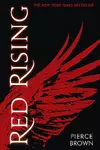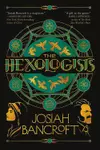Grant
A few quick thoughts:
- I struggle with Kruppe the narrator. I appreciate the idea of it but I didn't like reading it.
- I liked the idea of contrasting the actions of the youth vs the elders more than the execution as well
- God of Redemption vs Dying God also sets up interesting ideas that I struggled to engage with.
- Are you seeing a theme here?
As always, Erikson's zoomed out view of cyclical history due to human nature is present. This book seems to be examining faith and fanaticism more. There are multiple conversations about a god's responsibility to its followers but also its followers responsibility to the god. Betrayal can come from both sides and in fact the mortals can commit such atrocities in the god's name that it becomes too weak to stop them.
There's the strong gender and pregnancy theme/symbols but that was muddier to me.
Not my favorite of the series, I must confess. Some of my favorite ingredients were present (Trull + Onrock, Fiddler, paragraphs long anthropological screeds) but it never fully came together the way Chain of Dogs or Midnight Tides did.
If blockbuster movies were books? Excellent twists and turns, action sequences, and redemption arcs. The characters fill their archetypes well enough to be relatable but the story moves too fast for real depth. It works though, because the whole point is that what sets Darrow apart is his single minded focus on Eo's dream.
On a side note - if men of the alt right could read, I think this series would be right there with the Fight Club or American Psycho for beloved works where you're 100% missing the point.
What if abuse recovery had magic?
Takes some of the classic hallmarks of epic fantasy like duty, sacrifice, kingdom>self and shows the dehumanization of it and how it hollows its people out. Hobb does this without the cynicism of grim dark but care and love for her characters. Continuing the grimdark comparison: all the horror, abuse, and sorrow of grimdark is in this book. But Hobb's response is to root her characters in relationship. The magic system is one of connection and soul-level knowing of others. The bonds of love and pack drive our characters forward.
It feels like the fight to save the world is a fight to keep it from becoming one that Joe Abercrombie would write (no shade Joe, I love your books).
I know that life is hard and full of sorrows. I've no need for a reminder. It has been a delight to read a series that explores the human experience that uses an earnest desire to live well with others as a guiding light.
molly goated
What a refreshing read. All of the political intrigue but little of the cynicism and edginess of Grimdark. Hobb's character work is TREMENDOUS.
I haven't been this excited to discover a series/author in ages. There's a heart to this work that I think many fantasy authors don't have.
EDIT: (1 day after finishing) - I love how Chivalry hovers over the story. You can feel the way the kingdom and its people long for their missing prince. Fitz's natural actions for himself and others to confront Chivalry. We don't know him (yet i hope), but his presence is never far.
I enjoyed this book, but it wasn't quite what I was expecting. I'm still trying to adjust to give it a fair shake.
I think originally I thought it would explore the themes of faith, joy, grief, and endings through the lens of her family. She has her found family, but I missed the foil of her grandfather to provide a different immortal point of view. It almost felt like he was forgotten about for most of the book. There's a line early on where she says something like, “I know my grandfather's plans don't tend to go the way for you that you'd think they would”. I kept waiting for more proof of that besides her being turned into a vampire but it never showed up.
I loved Leo and her dynamic, but the flashbacks felt like less than the sum of their parts.
This is a good book. Kuang is very talented. My rating only reflects my enjoyment of the book, NOT its quality.
I just lost interest in all the characters. I think their arcs are well written, but they're not ones I enjoy. Which is a bummer, because I really like the series from a 5,000 ft level. The politicking, colonialism, and shifting geopolitical power dynamics are still compelling to me.
I'll probably just look up a summary of book 3.
An intense, queasy read made all the more sickening by the true events it revisits.
Heavy spoilers for the end of the book:
I appreciate Kuang's ability to make me both sympathize with and condemn Rin's actions. I stayed rooting for her even as she gave herself over to her hate more and more. She is put down, abused, and harassed at every turn in the story. She works hard to overcome the systemic disadvantages she faces to succeed. That pattern of overcoming an unfair obstacle endears her to us as readers. We feel righteous anger on her behalf. She is right to be angry at the injustice she sees. Even as she is radicalized, I'm sympathetic due to the horrors committed by the Federation. Yet for all that well-founded rage, I still balked at her committal of genocide. It's a powerful story moment and a harrowing climax. However, it's muddied by the real historical events the book is based upon. Many aspects of the setting and events seem to directly reference historical events, as opposed to events or settings inspired by history. I have higher expectations for the handling of the subject matter as a result. Using real-life atrocities to motivate your protagonist to commit their own genocide... is complex. As of now, it feels like a disrespectful and insensitive way to create the violence, bleakness, and moral ambiguity of Grimdark. That may not be the case though! The book ends with Rin feeling the weight of her actions. I hope Kuang continues to grapple with the ethics and consequences of Rin's genocide. I suspect the series's ongoing handling of it will strongly affect my views on this book.
Probably my favorite execution of the prodigy-goes-to-super-special-school trope in fantasy I've read as an adult. I'm also a sucker for the eccentric, incredibly powerful professor that everyone underestimates.
“So we connect more people,” it says. “That can be bad if they make it negative. Maybe it costs someone a life by exposing someone to bullies. Maybe someone dies in a terrorist attack coordinated on our tools. And still we connect people. The ugly truth is that we believe in connecting people so deeply that anything that allows us to connect more people more often is de facto good.”
Andrew “Boz” Boswell, FB executive and Zuck confidante in an internal memo
- It's easy to feel outraged reading a book like this and then do nothing. Turn Zuck or Meta into a bogeyman while shaking your fist in anger at the way the world is. I think real praxis is needed.
- There's a sense of tech optimism that algorithms and technology will allow us to transcend human foibles. That we can build a rational system allows us to go beyond what we know now, while also insulating us from making case-by-case decisions. It feels very Enlightenment to me (emphasis on what can be seen, measured, and “rationalism”). But again, it runs into the same issue big data and algorithms do - what are you measuring, how are you designing the system, etc. All of that is fraught with unintended consequences that aren't nearly so logical or moral as you might think. It's easy to bake systemic injustice into our algorithms because the data we have is inherently biased. It's easy to ignore the systemic effects of a technology when you're insulated from the worst of it.
- Facebook's pivot into the news space is when a lot of the troubles begin coming to a head. The old model of shareholder capitalism where (on the surface/explicitly) staying politically neutral (while ignoring the systemic effects of your business) doesn't work as a media company unwilling to take a moderating stand. That model works when people post about neighborhood events, sports, food pics, etc. However, moderation is needed when reporting (the search for truth and what happened) is invited onto the platform. We see a history of adverse outcomes pursued by motivated targets (Russian campaign, lying political ads, New Zealand shooter). It's hard work to moderate that and take a stand. I think there's a reason most traditional media companies that dealt with news and politics throughout history have had editors and pretty evident political bias. But that doesn't work when your goal is to connect the next 1 billion people, grow grow grow, and be palatable to all.
I like it but it's caught in this weird halfway space. It has the sparse, allegorical feel of a short story or novella but with the length of a novel. Nalini feels like an insert meant to explain the ideas that Johnson is trying to convey instead of a real character. I finished my story wishing Johnson had either leaned into the novel format by adding more depth or narrowed the scope to make it a punchy short story/novella.
It's a bummer because the message of the book is excellent.

















































